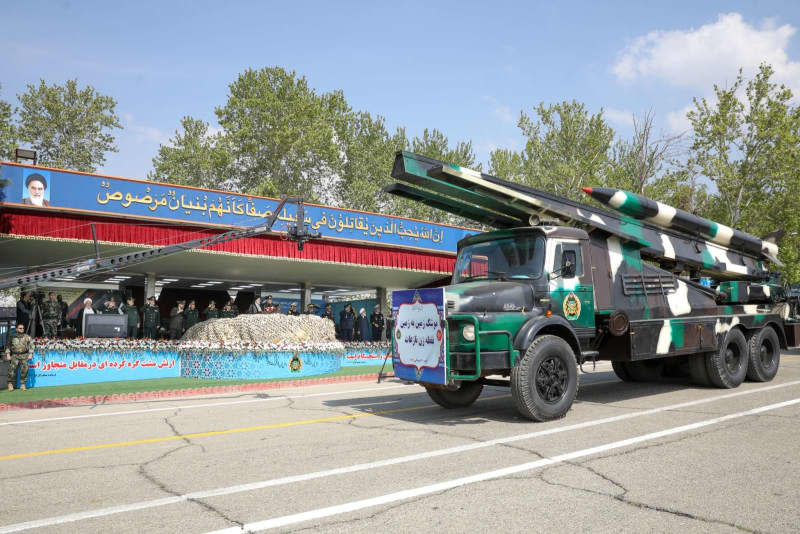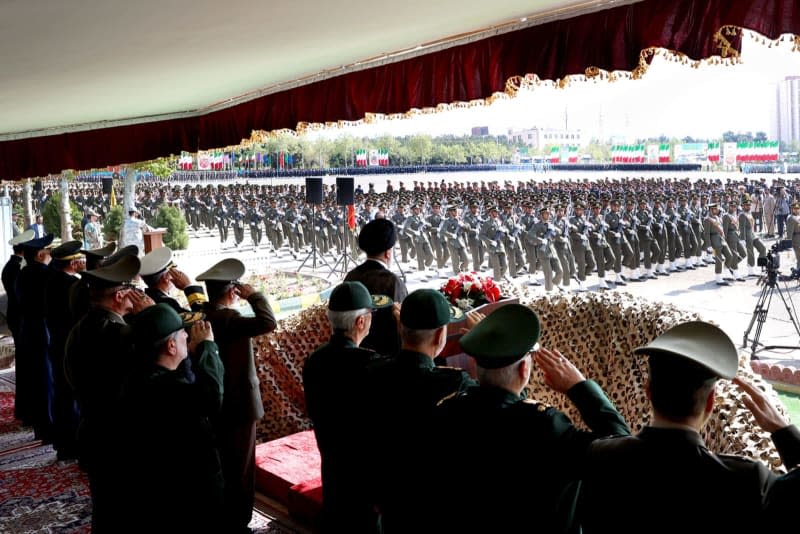Iranian commander says Tehran could review its nuclear doctrine

- Oops!Something went wrong.Please try again later.
An Iranian commander has hinted that Tehran could adopt a new course with its nuclear programme, in comments that come amid soaring tensions in the Middle East.
If Israel threatens to attack Iranian nuclear facilities and wants to put the country under pressure, a "review of the Islamic Republic's nuclear doctrine and policy" and an agreement on old principles is "possible and conceivable," said the commander for nuclear security, Ahmad Haghtalab, according to Tasnim news agency on Thursday.
So far, the Iranian leadership has always underlined that it does not aim to build nuclear weapons and that its domestic nuclear programme is purely for civilian purposes.
But Iran launched its first direct attack on Israel on Saturday, in retaliation for a suspected Israeli strike on the Iranian embassy compound in the Syrian capital Damascus that killed two generals, among others.
Tensions are soaring and Israel has vowed to strike back, threatening to hit Iran's military facilities, triggering concerns that the conflict could further escalate into all-out war.
Meanwhile Iran has been developing its nuclear facilities in recent years, while insisting these are solely for civilian purposes.
However, after lengthy negotiations due to concerns that Tehran could build a nuclear weapon, Iran signed a nuclear agreement to drastically restrict the enrichment of uranium and allow strict International Atomic Energy Agency (IAEA) checks in 2015.
But the United States pulled out of the agreement in 2018 under then-president Donald Trump, and Tehran began enriching uranium and came nearer to weapons-grade purity, while restricting IAEA inspections.
Recently, former leading Iranian politicians have hinted that the country is now technically capable of building nuclear weapons.
Iran's former nuclear chief Ali Akbar Salehi denied the country has military intentions when asked about this in two recent interviews.
"We are not seeking nuclear weapons... if we did, we would have announced it," he said.
Nevertheless, Salehi said the IAEA has expressed concerns that Iran has the technical capabilities to build a nuclear bomb.
Iran is currently enriching uranium to a purity level of 60%. A level of more than 90% is needed for nuclear weapons.
Critics have in the past expressed doubts about the civilian use of such highly enriched uranium.
Salehi also justified his country's decision not to pursue nuclear weapons with a fatwa, a religious legal opinion, issued by Iran's religious leader Ayatollah Ali Khamenei. In it, Iran's head of state had banned weapons of mass destruction.
Khamenei has the final say on all strategic issues in Iran.
Iran earlier said that it had not used its most modern weapons in its direct attack on Israel on Saturday.
Tehran sent missiles and swarms of drones to Israel in response to the Damascus strike. The Israeli military was able to intercept almost all of the weapons, with the help of allies.
A top commander in Iran's Islamic Revolutionary Guard Corps (IRGC) said the country's most modern missiles were not used in Tehran's attack.
"We used old weapons of minimal power against the Zionist enemy," Tasnim quoted Brigadier General Amir Ali Hajizadeh, commander of the aerospace forces, as saying on Thursday.
A year ago, for example, the IRGC presented a fourth version of its Khorramshahr medium-range missile, which can be equipped with a 1.5-ton warhead. Another missile that was not deployed, the Sejil, is said to be able to reach Israel in around seven minutes.
Iran frequently unveils new types of weapons, but claims about their abilities often cannot be independently verified by experts.
Iranian state media said Emad and Kheibar Shekan medium-range missiles were used in the attack on Israel. The Paveh cruise missile was also fired.


